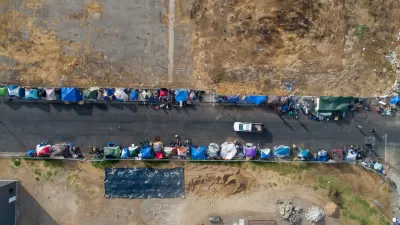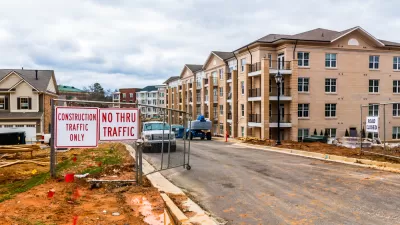An annual survey reveals that mayors want to prioritize spending federal funding on homelessness, transportation, and social services.

Mayors around the country are prioritizing homelessness and transportation as top needs that could be addressed by new federal funding, according to the annual Menino Survey of Mayors. The survey interviewed 126 mayors on issues related to COVID-19 responses, housing, and inequality and how they collaborate with the federal government to meet these challenges.
As Bill Lucia reports, when asked where they might spend their American Rescue Plan Act (ARPA) dollars, "21% of respondents said addressing homelessness, 18% transportation infrastructure, 15% social services, 15% housing and 13% answered either small business, municipal facilities, equity focused programs or broadband." A large majority of mayors believed ARPA funding could make a major difference for their cities.
According to survey results, less than a quarter of cities collect race and ethnicity data when planning climate resilience projects. Meanwhile, 75 percent of cities collect race and ethnicity data when documenting arrests. "Just over half of the mayors said that federal data reporting requirements are either 'very' or 'extremely' important for driving the race and ethnicity data that their cities collect," pointing to a need for more stringent federal regulations regarding data collection.
The report on the survey's finding concludes that, while the pandemic has had transformative effects on communities, mayors and city officials have developed innovative solutions that hold valuable lessons for policymakers at the state and federal levels.
FULL STORY: How Mayors Are Thinking About Prioritizing Federal Aid

Maui's Vacation Rental Debate Turns Ugly
Verbal attacks, misinformation campaigns and fistfights plague a high-stakes debate to convert thousands of vacation rentals into long-term housing.

Planetizen Federal Action Tracker
A weekly monitor of how Trump’s orders and actions are impacting planners and planning in America.

In Urban Planning, AI Prompting Could be the New Design Thinking
Creativity has long been key to great urban design. What if we see AI as our new creative partner?

King County Supportive Housing Program Offers Hope for Unhoused Residents
The county is taking a ‘Housing First’ approach that prioritizes getting people into housing, then offering wraparound supportive services.

Researchers Use AI to Get Clearer Picture of US Housing
Analysts are using artificial intelligence to supercharge their research by allowing them to comb through data faster. Though these AI tools can be error prone, they save time and housing researchers are optimistic about the future.

Making Shared Micromobility More Inclusive
Cities and shared mobility system operators can do more to include people with disabilities in planning and operations, per a new report.
Urban Design for Planners 1: Software Tools
This six-course series explores essential urban design concepts using open source software and equips planners with the tools they need to participate fully in the urban design process.
Planning for Universal Design
Learn the tools for implementing Universal Design in planning regulations.
planning NEXT
Appalachian Highlands Housing Partners
Mpact (founded as Rail~Volution)
City of Camden Redevelopment Agency
City of Astoria
City of Portland
City of Laramie





























